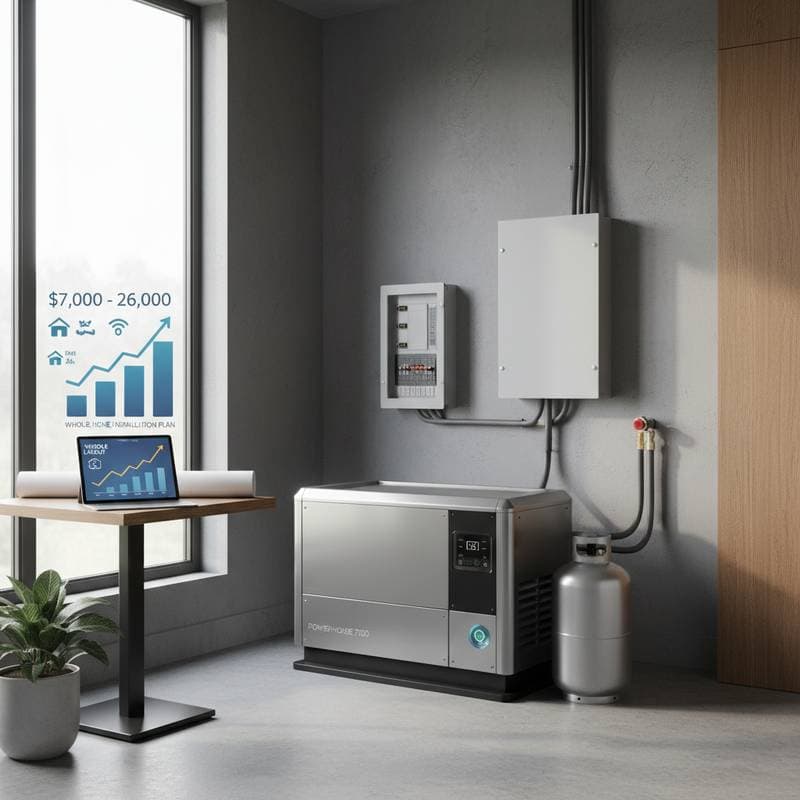What Drives Whole Home Generator Costs in 2025
Homeowners seek reliable backup power solutions amid increasing weather uncertainties and energy demands. Whole home generators provide seamless electricity during outages, but their costs vary widely. This article explores the primary drivers of pricing in 2025, from unit specifications to installation details, to equip you with knowledge for informed decisions.
Understanding these elements helps balance affordability with performance. Prices typically range from $7,000 to $26,000 for a complete system, including installation. Factors such as fuel choices and home layout play significant roles in determining the final investment.
Primary Cost Factors
Home Size and Power Requirements
The square footage of your residence directly impacts generator capacity needs. Larger homes with extensive electrical systems require higher kilowatt ratings, often 20 to 22 kilowatts, to power essentials like air conditioning, refrigerators, and lighting simultaneously.
Smaller properties might suffice with 10 to 16 kilowatt units, reducing upfront expenses. Assess your home's amperage and critical appliances to select an appropriate size. Oversizing leads to unnecessary costs, while undersizing risks inadequate coverage during blackouts.
Fuel Type Options
Generators operate on natural gas, propane, or diesel, each with distinct price implications. Natural gas models connect to existing utility lines, minimizing fuel storage needs but potentially increasing operational costs in high-demand areas.
Propane systems demand on-site tanks, adding $500 to $2,000 for installation, though they offer cleaner emissions and flexibility. Diesel units provide robust power for larger homes but involve higher initial prices due to durable components and fuel tank requirements. Evaluate local fuel availability and long-term usage to choose the most economical option.
Installation Complexity
Site preparation forms a substantial portion of total expenses, often 30 to 50 percent. Concrete pads, electrical wiring upgrades, and gas line extensions vary by property layout and soil conditions.
Urban homes may face fewer challenges than rural ones with uneven terrain. Professional assessments ensure compliance with local codes, preventing costly rework. Budget an additional $3,000 to $10,000 for these elements based on your home's specifics.
Additional Pricing Influences
Smart Features and Technology
Modern generators incorporate remote monitoring, automatic transfer switches, and app-based controls, enhancing convenience and reliability. These upgrades add $1,000 to $3,000 to the base price but reduce long-term maintenance through predictive diagnostics.
Battery-integrated models for hybrid systems gain popularity in 2025, supporting solar compatibility and quieter operation. Prioritize features that align with your lifestyle, such as load management to optimize fuel efficiency during extended outages.
Permits, Codes, and Location
Regulatory requirements differ by region, with permits costing $200 to $1,000. Coastal or seismic zones impose stricter standards, elevating engineering fees.
HOA guidelines or historic district rules may necessitate aesthetic enclosures, further increasing expenses. Consult local authorities early to anticipate these hurdles and incorporate them into your budget.
Maintenance and Warranty Considerations
Annual servicing runs $200 to $500, influenced by model complexity and fuel type. Extended warranties, priced at $300 to $800, cover repairs beyond the standard one- to two-year period.
Brands like Generac or Kohler offer comprehensive plans that mitigate unexpected costs. Factor in these ongoing expenses when evaluating total ownership over a decade.
Cost Examples by Scenario
For a 2,000-square-foot home in a suburban area, a 16-kilowatt natural gas generator with basic installation totals around $12,000. This includes a standard transfer switch and minimal site work.
A 4,000-square-foot estate opting for a 22-kilowatt propane unit with smart features and custom pad might reach $22,000. Diesel alternatives for remote properties could push costs to $26,000 due to robust builds.
These figures reflect 2025 averages; obtain multiple quotes for precise estimates. Variations arise from regional labor rates and material inflation.
Strategies to Manage and Reduce Costs
- Conduct a professional load calculation to avoid overbuying capacity.
- Compare at least three contractor bids, focusing on licensed installers with generator specialization.
- Explore financing options or rebates for energy-efficient models through utility programs.
- Time purchases during off-peak seasons to negotiate better rates.
- Integrate with existing home systems, like solar, to qualify for incentives.
These steps minimize hidden fees, such as expedited permitting surcharges. Verify contractor credentials through industry associations for quality assurance.
Securing Reliable Power for Your Future
Investing in a whole home generator safeguards your comfort and safety against disruptions. By dissecting cost drivers and applying practical strategies, you position yourself for a worthwhile purchase.
Focus on long-term reliability over short-term savings. With careful planning, this essential upgrade delivers peace of mind for years ahead.





